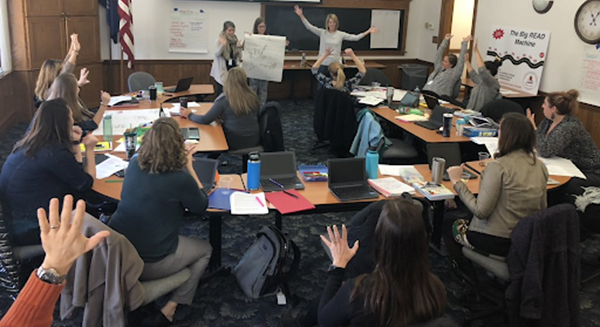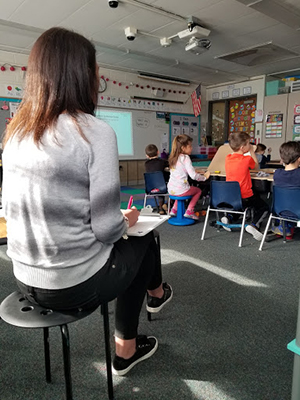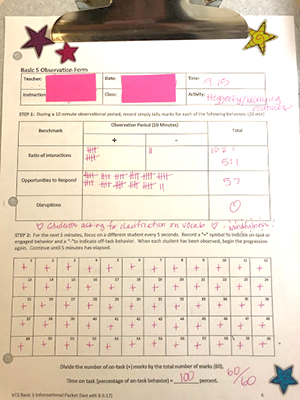March 19, 2019

“Hi, Mrs. Wilson!”
“Look, guys, it’s Mrs. Wilson!”
Mrs. Laura Wilson was greeted with smiles and waves upon walking into Mrs. Chelsie Schimp’s first grade classroom. She returned the high-fives of several students as she walked quietly into the room and took a spot in a chair near the back. Laura recognizes the importance of building relationships with both students and teachers in her role as instructional coach for Vicksburg Community Schools.

Teachers, like all professionals, hone their knowledge and skills with on-the-job support. Not only does this type of embedded professional development improve instructional practices, but it has a direct effect on student achievement. This support starts with mentoring for early-career teachers who are in their first three years in education. It continues with coaching for more experienced educators, which is often seen as a critical strategy to retain our talented educator workforce.
I had the pleasure of shadowing Laura. This confirmed my growing belief that effective instructional coaches for all teachers in Michigan are a crucial step to propel Michigan to meet the goal set forth by the Michigan Department of Education to be a Top 10 State in 10 years.
Vicksburg Community Schools employs four full-time instructional coaches. These coaches work closely with teachers to impact student learning and academic achievement. Every early-career teacher is matched with an instructional coach. These coaches guide the first-, second- and third-year teachers through Instructional Skills classes to meet the extra professional development requirements set forth by the state.
The coaches customize the course content so that this professional development opportunity is not just a box to be checked, but an authentic, relevant and collaborative use of the educators’ valuable time. Topics include accessing teacher resources, the teacher support plan, Michigan’s online educator certification system, new district initiatives, book studies, evaluations, student learning objectives and more. Break-out learning to meet the needs of the diverse group of early-career educators is also a part of this professional development, as the coaches recognize that the learning needs of school psychologists differ from the needs of early childhood teachers or career/technical education teachers.
Although the learning facilitated during these Instructional Skills courses is critical to ensuring new teacher growth and efficacy, the job-embedded professional development that they provide offers opportunity for growth throughout the school year. The Vicksburg instructional coaches support all teachers with technology integration, co-teaching opportunities, individualized, classroom-based coaching and more. The overall goal is to support implementation of effective instruction within the core content in order to impact student achievement and academic growth.

“Basic 5” visits direct the self-reflection and growth process for new Vicksburg teachers. Data is collected in five areas during these brief, 15-minute visits. First, teacher direct instruction is observed and documented. A classroom lecture is generally the image most commonly associated with direct instruction, but the term encompasses a variety of teaching techniques and instructional scenarios including establishing learning objectives, checks for understanding, reviewing instructions, modeling a process, or providing feedback to students.
The second piece of data that is collected focuses on interactions between the teacher and the students. Increasing the number of positive interactions with students is the most effective step that teachers can take to connect with their students and improve overall classroom climate. The number of positive interactions compared to the number of negative interactions is observed in order to give teachers specific data on which to reflect.
Third, the coaches record the number of instructional opportunities in which students were invited to respond verbally (e.g. choral response, turn-to-your-neighbor), with a gestural response (e.g. thumbs up/down, fist of five, wait time) or in written form (e.g. individual student whiteboards, response cards).
Next, the coaches collect data on the number of student disruptions that interfere with an ongoing class activity. This information is not judgmental, but is simply additional data for the teacher to consider when reflecting on her pedagogy.
Finally, each student in the class is observed for a five-second time period. The coach observes individual student engagement at this time by looking for evidence of students attending to the materials and task, asking for assistance or waiting for assistance in an acceptable way, and making appropriate motor responses such as writing or looking at the teacher.
These “Basic 5” visits focus on teacher growth and student instruction. They are intended to be non-evaluative, warm and welcoming. The data collected is truly for the teacher to use to reflect and set goals, and it is tightly guarded. The building principal does not see the data that the coach collects, and the coach did not share this teacher data with me on my visit, either. Teachers trust the coaches to guide them through a self-reflective process of growth, based on information specific to their students and their setting. Teachers and their coach work together to facilitate this growth.
Laura Wilson describes a coach as “trustworthy, a good communicator, positive, supportive and knowledgeable.” She points out that it is “very important to always keep your ‘teacher hat’ on and remember what it is like to be a classroom teacher.” Laura works really hard at this, and mentioned that with the growing expectations on classroom teachers today, it is essential to remember what it is like in the classroom in order to relate and empathize with the struggles that classroom teachers face.
Throughout our conversation, Laura stressed that the Vicksburg instructional coach services are “intended to be job-embedded professional learning. Teacher needs are met right in their own classroom, tailored to individual teachers and sets of students. You don’t have to leave your classroom or leave your district to receive the support that you need.”
Laura strives to be an advocate for teachers. She works with countless teachers all around the district and consistently celebrates the good things, elevates teacher concerns, and supports what they need so that students can be successful.
Report after report in Michigan agrees that effective teachers are key to improving student learning and outcomes. This is supported by research that shows effective teaching is the No. 1 in-school factor for student learning. A recent study found that 82 percent of teachers who received feedback from a coach or mentor at least once per year found that feedback helpful for improving instructional practice.
We are fortunate in Vicksburg to have a cadre of dedicated instructional coaches. However, highly effective coaches are not yet in place in every district across the state. To remedy this need, I offer several recommendations:
- I encourage local districts to support flexibility and innovation to allow Michigan’s strongest teachers to serve as instructional coaches without permanently leaving the classroom or school.
- I encourage the state to create financial incentives for districts to provide an adequate number of instructional coaches to teachers. Teachers who take on additional leadership roles and responsibilities to become a coach must be compensated in return. Investment will also be needed at the state level to ensure that high-quality coaches are ready to lead to improve instructional practices and student outcomes.
- I encourage the state to establish standards for recruiting effective coaches who have a record of strong student outcomes in the regular classroom setting, along with the adoption of a common training system and curriculum to prepare and support coaches. All stakeholders, including teachers and administrators, must be invited to the table to help develop these standards and practices.
A special thank you goes to Laura Wilson, Vicksburg Community Schools Instructional Coach, for allowing me the opportunity to experience coaching from her side of the clipboard.
I am eager to hear about instructional coaching programs and insights from your corner of Michigan and encourage you to reach out to me to share your experiences. Thank you!
 Laura Chang is Michigan’s Teacher of the Year for 2018-19, and Meemic is proud to partner with the Michigan Department of Education for the program. Laura is entering her nineteenth year of teaching at Sunset Lake Elementary in Vicksburg Community Schools, where she is currently a K-5 interventionist.
Laura Chang is Michigan’s Teacher of the Year for 2018-19, and Meemic is proud to partner with the Michigan Department of Education for the program. Laura is entering her nineteenth year of teaching at Sunset Lake Elementary in Vicksburg Community Schools, where she is currently a K-5 interventionist.